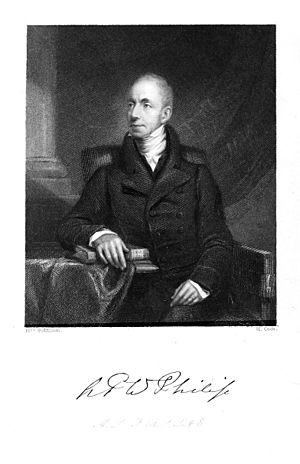Alexander Philips Wilson Philip facts for kids
Alexander Philips Wilson Philip was a very smart Scottish doctor and scientist who lived from 1770 to about 1847. He was a member of important scientific groups like the Royal Society and the Royal Society of Edinburgh. Dr. Philip loved to do experiments to understand how the human body works, especially focusing on how we digest food, how blood moves around, and how our nervous system (brain and nerves) functions. He wrote many books about medicine. Later in his life, he faced some financial difficulties and moved to France, where he spent his final years.
Contents
Early Life and Education
Alexander Philip Wilson was born in 1770 in a place called Shieldhall, near Glasgow, Scotland. His parents were Agnes Gillespie and Alexander Wilson. When he was young, his family's estate was sold. Later, in 1811, he changed his last name from Wilson to Philip. This was after his grandmother, Susannah Wilson, passed away.
He went to school at the High School in Edinburgh. After that, he studied medicine at the University of Edinburgh. He earned his medical degree (MD) in 1792. This meant he was a fully qualified doctor. During his studies, he was influenced by other famous doctors like William Cullen. In 1791, he became a member of the Royal Medical Society.
His First Experiments
For his medical degree, Dr. Philip wrote a special paper called a thesis. It was all about how digestion works, based on his own experiments. He even did some experiments on himself! For example, he would drink orange juice and then make himself sick the next day to see how the juice had been digested. In 1795, when he was only 25, he was chosen to be a Fellow of the Royal Society of Edinburgh. This was a big honor, showing he was a respected scientist. In 1797, he became the President of the Royal Medical Society.
Medical Career and Discoveries
In 1798, Dr. Philip moved to Winchester in England to work as a doctor, staying there until 1802. Then, he moved to the Worcester General Infirmary, where he worked until 1817. He became well-known for his scientific approach to medicine, always wanting to test things out.
Studying Fevers and the Heart
Along with another doctor, William Cullen, Dr. Philip studied diseases that cause fevers. He wrote a four-book series about these diseases between 1799 and 1804. While working at Worcester Infirmary, he did some important experiments. He showed that the heart could beat on its own, even without direct signals from the brain or spinal cord. However, he also noticed that certain medicines that affected the brain could still influence the heart. This was a key discovery about how different parts of the body work together.
Focus on Digestion and Later Life
After 1817, Dr. Philip moved to London. By 1824, he was living in Cavendish Square. In London, he became very interested in how diet affects health and problems like dyspepsia (indigestion). This might have been because some of his important patients in the area had these issues. In 1826, he was elected a Fellow of the Royal Society, another very high honor for a scientist. Around 1834, he shared his idea that death happens when a person can no longer feel anything. Around 1843, he faced financial challenges and moved to France. He is believed to have passed away sometime between 1847 and 1851.
Family
Alexander Wilson Philip married Mary Domvile in 1811. They had three children together.
 | Sharif Bey |
 | Hale Woodruff |
 | Richmond Barthé |
 | Purvis Young |


